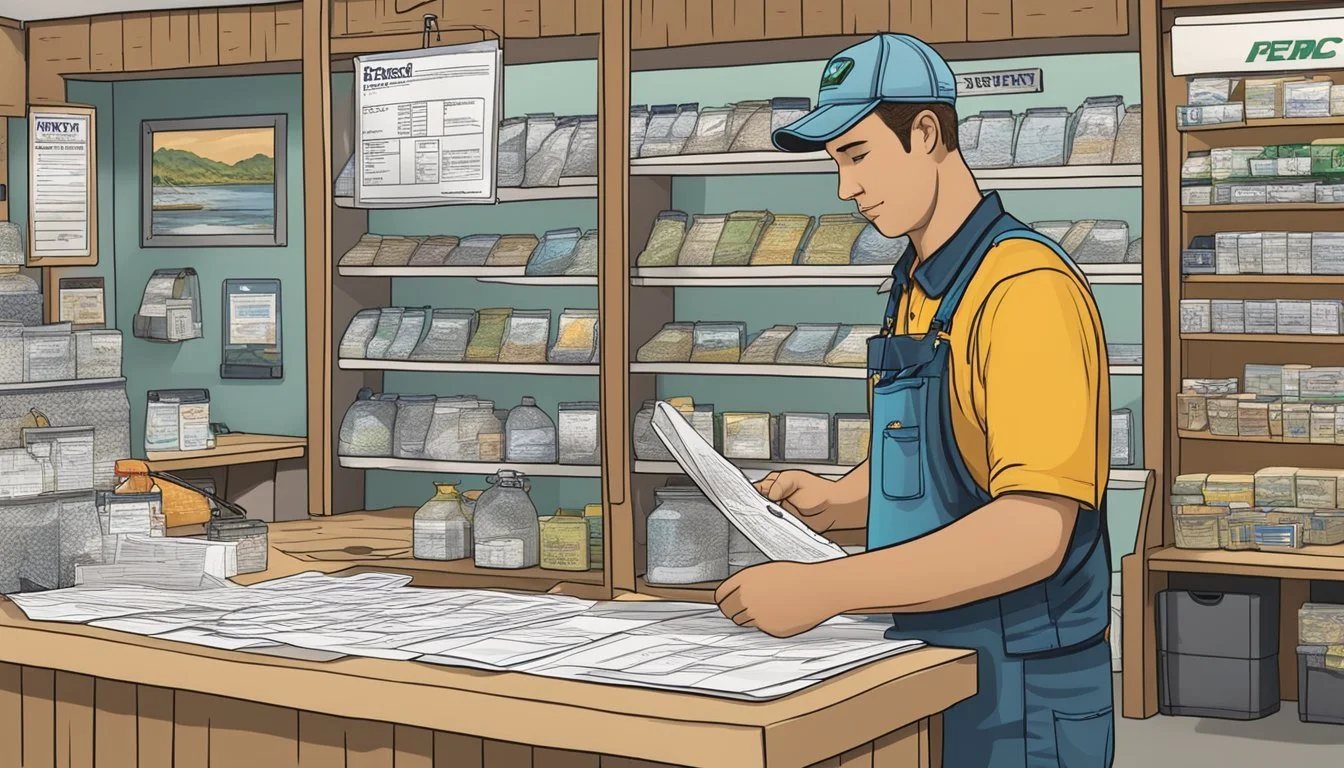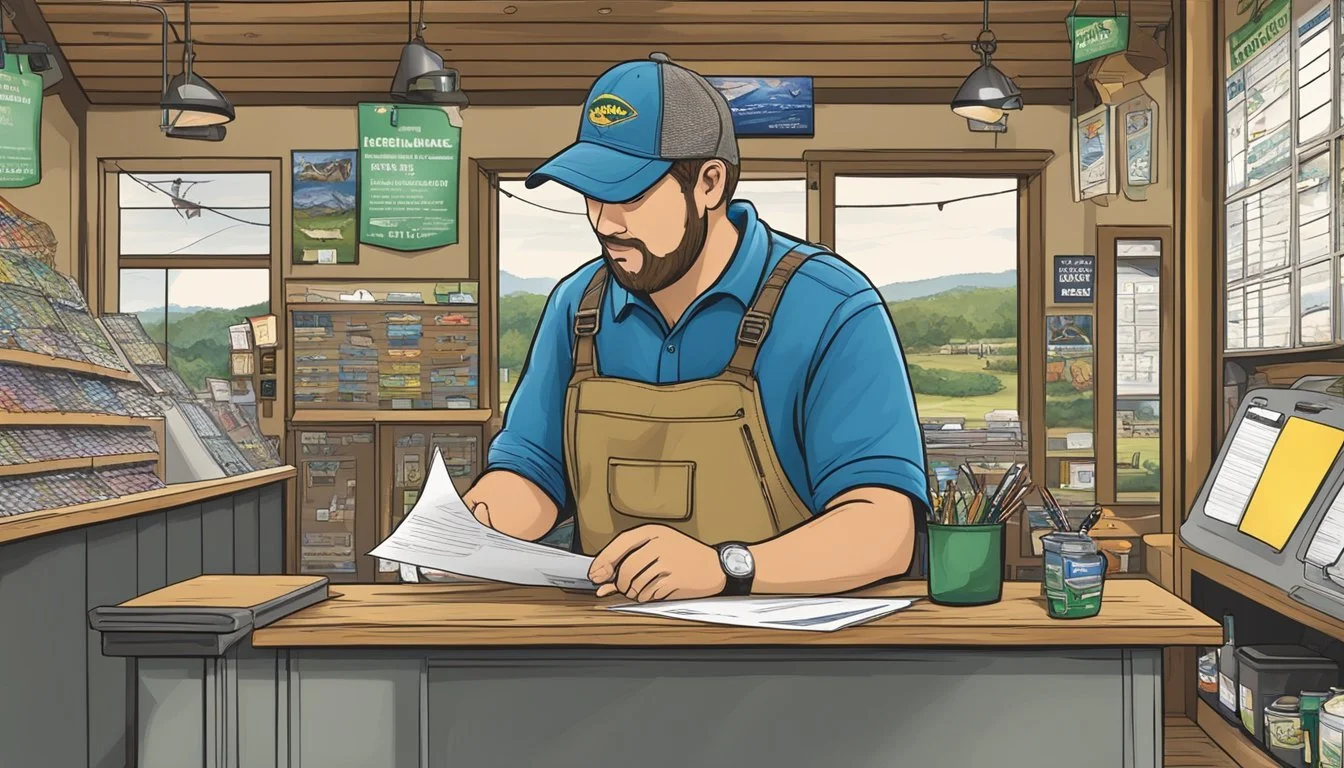How to Get a West Virginia Freshwater Fishing License
A Simple Guide
Fishing enthusiasts looking to experience the freshwater angling opportunities in West Virginia must ensure they comply with the state's fishing regulations by obtaining a valid West Virginia fishing license. These licenses cater to both residents and non-residents and are mandatory for anyone engaging in the sport of fishing, with a few age-related exceptions. With a diverse range of fish species populating West Virginia's rivers, lakes, and streams, a fishing license is the gateway to exploring these aquatic treasures legally and responsibly.
The West Virginia Division of Natural Resources facilitates a streamlined process for purchasing fishing licenses. Interested individuals can acquire a license online through the state's Electronic Licensing & Game Check System, or alternatively, at roughly 180 retail license agents situated throughout the state. Online purchases may incur a small issuing fee, but they offer the convenience of immediate access to licensing, which can be printed right from home. The system also provides options such as lifetime licenses and digital gift certificates, which can be used towards a variety of hunting and fishing privileges.
In addition to understanding how to obtain a license, anglers must familiarize themselves with the current fishing regulations to preserve West Virginia's natural resources. These regulations govern species-specific catch limits, size restrictions, and seasons to ensure sustainable fishing practices statewide. By adhering to these rules and possessing an up-to-date fishing license, anglers contribute to the conservation efforts while enjoying the rich fishing opportunities that West Virginia has to offer.
Eligibility Requirements
In West Virginia, acquiring a freshwater fishing license requires meeting specific eligibility criteria. The eligibility varies between residents and non-residents of West Virginia and is determined based on valid identification and resident status.
Resident Eligibility
Residents of West Virginia must provide a valid form of identification such as a WV driver’s license or a WV photo ID card issued by the Division of Motor Vehicles to obtain a fishing license. Resident landowners, those who are legally blind, and developmentally disabled residents with a DD214 card can have specific concessions. Individuals 15 years and older require a fishing license, while residents 65 years and older do not need a fishing license but should carry their WV identification.
Non-Resident Eligibility
Non-residents, like residents, must also provide a valid form of identification when purchasing a non-resident fishing license. Those under the age of 15 do not require a license. Members of the U.S. Armed Forces on active duty stationed in West Virginia, as well as those home on military leave with a leave number, are eligible for resident fishing licenses.
Types of Licenses
West Virginia offers a variety of fishing licenses to cater to different angling needs. These licenses are requirements for anyone seeking to fish in West Virginia's freshwater bodies and range from short-term options for visitors to lifetime licenses for residents.
Annual and Short-Term Licenses
Residents and non-residents can opt for annual fishing licenses, allowing them to fish throughout the year. Those planning a brief stay or looking to fish just a few days can purchase a five-day fishing license.
Lifetime Licenses
Lifetime licenses are an investment for avid anglers, granting permission to fish indefinitely. There's a resident lifetime hunting, fishing, and trapping license, and also a junior sportsman and a regular sportsman hunting/fishing/trapping license. These comprehensive licenses cover a wide array of outdoor activities beyond just fishing.
Special Licenses
Special licenses include a trout fishing stamp mandatory for those targeting trout and a conservation stamp necessary for certain types of fishing and hunting. Additionally, there are specific licenses for use in national forests that cover hunting, trapping, and fishing activities. These stamps and special licenses are often purchased in addition to the base fishing license.
How to Purchase a License
When seeking to obtain a West Virginia freshwater fishing license, anglers have two primary paths: they can complete the process online through a secure electronic licensing system or opt for an in-person purchase at designated locations. These methods cater to preferences for convenience and accessibility.
Online Purchases
Individuals can acquire a West Virginia fishing license online by visiting the www.wvhunt.com portal. One must first create an account, providing their last name and date of birth, along with other necessary personal information. Upon logging in, the user will navigate to the section labeled Purchase a license, tag, or permit. A range of products will be displayed, from which the appropriate fishing license can be added to the cart. The electronic licensing system ensures a secure checkout process; after selecting the required license type, users can proceed to checkout and enter their payment details to complete the purchase.
Visit www.wvhunt.com
Enroll today by creating an account with the last name and date of birth required
Select Purchase a license, tag, or permit
Add to cart and proceed to secure checkout
In-Person Purchases
For in-person purchases, the West Virginia Division of Natural Resources (WVDNR) has authorized numerous locations across the state. These include hunting and fishing stores, various benevolent institutions, and even some state mental hospitals where licenses are made available. The buyer is required to provide personal identification, typically including a last name and date of birth, to ensure that the license is registered correctly.
Locate a nearby in-person purchase site via wvdnr.gov
Present personal identification at the point of purchase
Complete the transaction to receive the fishing license
Each method provides a straightforward approach to obtaining a fishing license, ensuring that anglers are legally prepared to enjoy the freshwater angling opportunities that West Virginia offers.
Additional Requirements
Securing a West Virginia freshwater fishing license involves meeting specific additional requirements beyond the initial purchase. These requirements ensure that anglers contribute to conservation efforts and abide by regulations designed to maintain sustainable fisheries in the state.
Stamps and Permits
Individuals seeking to fish in West Virginia may need to purchase certain stamps and permits in addition to their fishing license, depending on the activities they plan to engage in. For example:
Conservation Stamp: Required for most licensed anglers except holders of certain license types such as Class X, XS, or lifetime licenses. The Conservation Stamp supports wildlife management and habitat preservation.
Trout Stamp: Anglers who wish to fish for trout must obtain a Trout Stamp in addition to their fishing license.
Proof of Eligibility
Eligibility for certain types of fishing licenses and fee exemptions requires specific documentation:
Residency: A valid West Virginia driver’s license or a WV photo ID card from the Division of Motor Vehicles serves as proof of residency.
Age: Older residents and youth under certain ages may not require a license; however, they must carry proof of age when fishing.
Former Prisoners of War and Disabled Individuals: Special licenses or fee exemptions may apply, requiring documentation such as a DD Form 214 or certification of disability.
Military and Veterans
Members and veterans of the U.S. Armed Forces are eligible for special considerations:
Active Military Leave: Individuals on active military leave can obtain a fishing license at a reduced fee or may be exempt from purchasing a license while home on leave. Proof of leave or military orders must be presented.
Resident Veterans: Resident military veterans with a service-connected disability may be entitled to reduced-fee licenses. Documentation verifying service and disability status is required.
Fishing Regulations
In West Virginia, anglers should acquaint themselves with the regulatory framework set by the West Virginia Division of Natural Resources, which ensures sustainable fishing practices and the protection of fish populations throughout the calendar year.
Protected Species
West Virginia designates certain fish as protected species, either year-round or during specific times, to preserve biodiversity and maintain healthy ecosystems. Anglers must comply with these protective measures and are prohibited from taking or targeting species that are listed under protection.
Fishing Seasons
West Virginia fishing regulations stipulate distinct fishing seasons for various species to help manage fish populations effectively. For example, trout fishing often has a defined season that can vary annually, so anglers must check the current year's fishing guide for precise dates.
Size and Catch Limits
The state enforces size and catch limits on popular species such as smallmouth bass, rainbow trout, northern pike, and muskellunge. Specific limits are as follows:
Smallmouth bass: Minimum size of 12 inches with a daily creel limit of 6.
Rainbow trout: No minimum size with a daily creel limit of 6.
Northern pike: Minimum size of 24 inches with a daily creel limit of 2.
Muskellunge: Minimum size of 30 inches with a daily creel limit of 1.
Anglers must ensure they are familiar with the size and catch limits for the species they intend to fish, as these regulations are crucial for conserving fish stocks and ensuring future angling opportunities.
Special Considerations
When obtaining a West Virginia freshwater fishing license, certain groups of individuals can anticipate unique conditions that may influence the licensing process. Special considerations are in place to accommodate these groups, tailoring the opportunities provided in fishing to their specific needs or entitlements.
Resident Landowners
Resident landowners, including their children and spouse, may not need a license to fish within the boundaries of their own land. Ownership of the property confers the benefit of accessing hunting and fishing opportunities on their land without the customary licensing requirements. However, this privilege strictly applies to private ponds and streams where fishing rights are not leased to another party.
Accessibility for Disabled Anglers
West Virginia demonstrates a commitment to ensuring that individuals with disabilities have ample opportunity to engage in fishing. Those who are legally blind or developmentally disabled have access to free fishing licenses or permits. Proof of disability is required, and once obtained, these individuals may fish in all public waters.
Legally Blind Anglers: Can obtain a fishing license at no cost.
Developmentally Disabled Residents: Eligible for disability-related licensing accommodations.
Youth Anglers
West Virginia encourages young anglers to participate in fishing, offering discounted licenses for the junior sportsman hunting/fishing/trapping category. This includes:
Youth under 15: Not required to have a license when accompanied by a licensed adult.
Youth aged 15-17: Can obtain a "junior" license at a reduced cost, promoting early engagement in the sport.
Licenses for youth are designed to instill a passion for outdoor sports while acknowledging the importance of responsible wildlife stewardship from an early age.
Frequently Asked Questions
Do You Need a License to Fish in West Virginia?
Yes, both residents and non-residents must obtain a license to fish in West Virginia's freshwater areas.
How Can One Purchase a West Virginia Fishing License?
Licenses are available:
Online through the Electronic Licensing & Game Check System
At approximately 180 retail license agents statewide
Directly from the West Virginia Department of Natural Resources (WVDNR) by phoning their office
What Types of Licenses Are Available?
West Virginia offers various licenses, including:
Annual licenses
Short-term or 5-day licenses
Lifetime licenses for avid anglers
Are There Different Licenses for Residents and Non-Residents?
Yes, license fees and requirements differ between residents and non-residents. Non-residents also have the option to purchase short-term licenses.
Is a Combination Hunting, Trapping, and Fishing License Available?
West Virginia offers a combination license for residents, which includes hunting, trapping, and fishing privileges.
What Is the Cost of a Fishing License in West Virginia?
Costs vary depending on the type of license and residency. It is best to check the latest fees on the WVDNR's official website or through their customer service.
Can You Fish for Free in West Virginia?
Free fishing days are occasionally offered, allowing individuals to fish without a license. However, these are specific days throughout the year.
For more specific information or to address further questions, individuals can contact the Hunting and Fishing License Unit at the West Virginia Department of Natural Resources.









